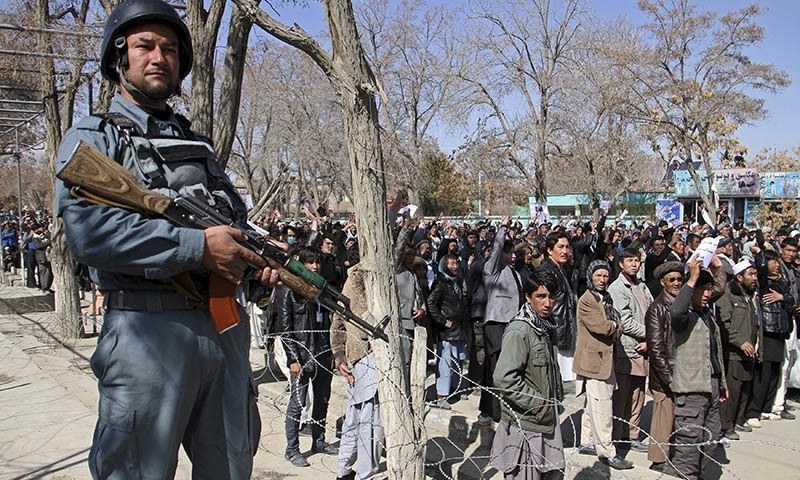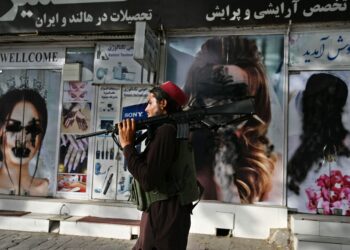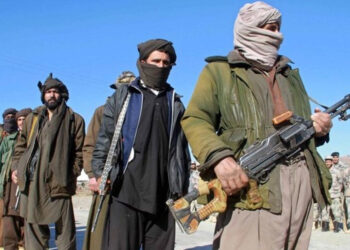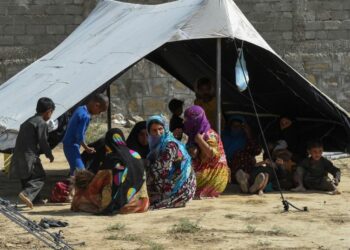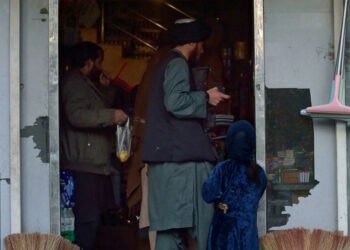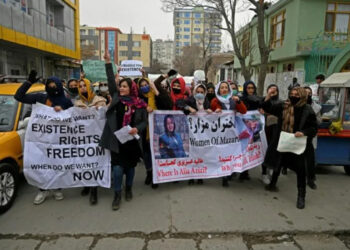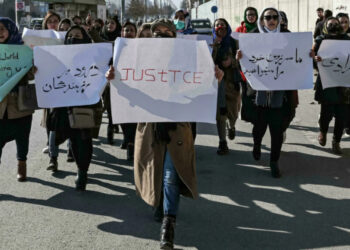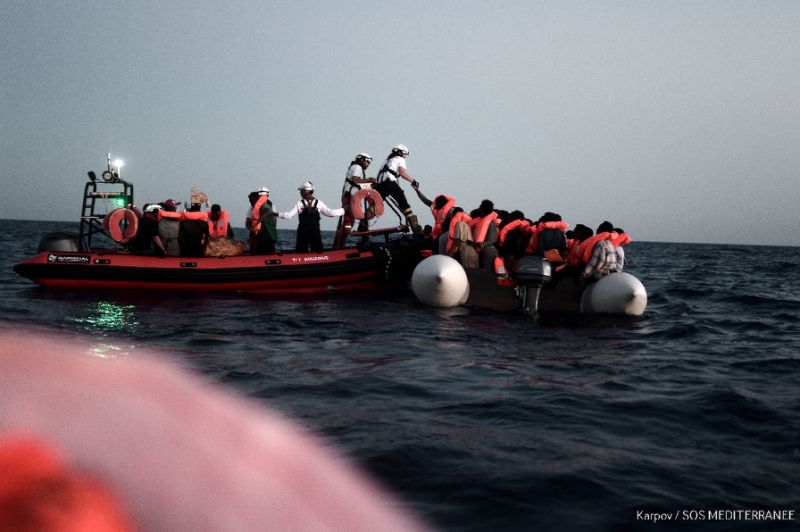Since the creation of Afghanistan as a false “nation-state” centuries ago, its rulers and their patrons have failed to establish a just, all-inclusive and democratic political system that is suitable for the country – an ethnic heterogeneous “state-nation.” Thus, thanks to transcending radical tribal supremacists, Afghanistan has been prone to savage racial ideologies such as ethno-nationalism.
There seems to be no ending to this savagery even in modern times given its escalation under Ashraf Ghani’s controversial tenure. If “President” Ghani has done anything tangible since he came to power, it is the spread of ethno-nationalism to a greater extent. These days, ethnopolitics is the podium of public reasoning in the country. The language and the hate speech directed at various ethnic groups are war-mongering and destabilizing.
I was walking in the center of Kabul with my colleagues last year, when we came across an acquaintance of theirs, a hairdresser, a young, enthusiastic Pashtun boy. “Thank God you’re Pashtun,” he said when I positively responded to his question about it. His reaction shocked me and put me on a personal mission to fight the menace of ethno-nationalism in my country.
The barber boy represented ill-informed dogmatic ethno-nationalists who call Ashraf Ghani their Pashtun spiritual father, “baba.” The threats their ideologies pose to Afghanistan are far worse than the menace of terrorism. They openly call for the alienation of non-Pashtun ethnic groups and proudly refer to dark accounts of history when tyrant “Afghan” rulers pursued ethnic cleansing as a state policy.
Open Secret Domestic Geopolitics
Through the lens of geopolitics, a study with a mere emphasis on a given territory’s demography-geography-economy as the main factors shaping its fate, Afghanistan is described as “the land bridge,” a country with untouched natural resources, and a military strategic point for “empires.”
However, Afghanistan’s demography is not discussed, beyond misguiding statistics on tribal population census, to understand geopolitical grievances of its diverse ethnicities, representatives of different civilizations.
Ethnic groups have geopolitical representation rights of their places of origin, from where they display their distinct cultures, civilizations’ evolution, traditional rituals and lifestyle in the form of independent “nation-states,” autonomous or semi-autonomous regions.
Almost every ethnicity in Afghanistan has larger geopolitical representation beyond the country in the neighboring kin-states (for example, Uzbeks in Uzbekistan, Hazaras, and Tajiks in Iran and Tajikistan). But Pashtuns are the only ethnic minority group with a semi-autonomous region, Waziristan, which is also on the verge of full inclusion into the “nation” of Pakistan.
Uzbekistan, Iran, and others have been engaged in kin-state activism. While this is legal under international law, as it allows to promote their descendent tribal representation in Afghanistan by offering socio-economic and political support, Pakistan has sporadically supported some radical elements (like the Taliban and Hezbe-i-Islami of Hekmatyar) to escalate violence in Afghanistan. Is the Taliban’s entrenched connection to the Pakistani deep state actors (ISI) and their use as an instrument of pressure against Afghanistan and the region not a living example here?
Pakistan has been pursuing an undeclared anti-Pashtun policy by systemically radicalizing Pashtun youths through Madrasas (religious schools). Pashtun leaders should stand up against this cycle of radicalization – instead of promoting ethno-nationalism that further radicalizes the Pashtun youths – by weaning themselves off their love-hate marriage with Pakistan.
Legitimate Grievances, Illegitimate Approaches
Pashtuns have geopolitical rights to representation in Afghanistan and the region, as do other tribes. A legitimate way to address such grievances would be to decentralize Afghanistan in a similar way that has taken Switzerland to socio-economic and political heights. Afghanistan could have cantons instead of provinces to allow its diverse demographic groups flourish with their culture, lifestyle and belief systems.
Pashtuns have legitimate concerns that their kleptocrats and demagogic leaders have hijacked “stock-in-trade” for personal political gains on the basis of racial ideologies. They have constantly promoted a false belief that the Pashtun race is superior to every other in Afghanistan.
Ghani’s unilateral move to include “Afghan” as an overarching national identity in the new national electronic ID cards, which have printed camels in the background to resemble Pashtun nomads, as well as his decision to wear traditional Pashtun clothes and Peshawari footwear during his recent visit to Balkh province – the land of Rumi: Persia – constitute illegitimate behavior of an illegitimate head of an ethnically-diverse “state-nation.”
Such “revisionist” conduct may appease dogmatic ethno-nationalists, but they insult non-Pashtuns and severely harm the spirit of “unity in diversity” in Afghanistan. A real president of a “state-nation” not only represents all ethnic groups but also avoids undermining them.
“Undoubtedly many Geopolitical ideas of the kind that was en vogue in Nazi-Germany … belonged to the intellectual stock-in-trade of a small circle of people”, Gertjan Dijkink wrote in Geopolitical codes and popular representations in 1998.
Ghani and his “small circle of people” do not echo the general sentiment of the well-regarded Pashtun community in Afghanistan, the real leaders of which have already opposed and rejected Ghani’s racial ideologies.
Nonetheless, ethno-nationalism has created dogmatic ethno-nationalists in various shapes and forms in Afghanistan. Some of them, like the Taliban, have embraced violence by corrupting jihad to fight an endless war, and some are in power tirelessly working to demoralize non-Pashtun communities.
Altogether, they are threatening the region as a whole with violence and hate speech hoping for a fallout that will not only devastate tribal dynamics in Afghanistan but also reshape the region, as did Nazi-Germany in Europe in the 20th century.
Peace with the Ethnonationalist Taliban and War with Others
Since his “illegitimate capture of the presidency,” Ghani has been consolidating state power in his hands. He may believe that his direct control of the Armed Forces, backed by the U.S. military, has granted him a monopoly over state violence that can be used against potential dissent by non-Pashtun ethnic groups. Is it surprising that he provokes it?
He must have thought over his recent military maneuver in Faizabad, Badakshan’s capital, to conduct airstrikes against areas populated by non-Pashtun citizens protesting “Afghan” e-ID cards, as well as his decision to declare a ceasefire with the Taliban.
A potential ethnic war seemingly hands Ghani the opportunity to achieve two milestones in his tribal agenda: first, the integration of the Taliban as state-sponsored foot soldiers of ethno-nationalism; second, the utilization of the American-led international force against the “Northern Alliance,” an ironic twist of what took place in 2001.
“The rise of the Taliban generated optimism among the Pashtuns about a reversal of their decline … The U.S. does not support the Rabbani government, and there have been rumors that it is indirectly supporting the Taliban, who oppose that government,” Anwar-ul Haq Ahady explained long before the terrorist attacks of 9/11.
If Ghani succeeds in building an alliance with the Taliban, it would mean war with other ethnic groups in Afghanistan. It would imperil nearly two decades of international efforts to promote democracy, human rights, and the rule of law by returning the country back in time to the 1990s civil war with the Taliban.
Therefore, the U.S.-led international representation in Afghanistan has a moral responsibility to prevent such worse case scenarios from happening by scrutinizing Ghani’s peace politicking with the Taliban and his ethnocentric agenda in Afghanistan.
“The President” is left with too much power and political leverage to resist the temptation of using them for an evil cause, such as racial supremacy, to trigger another human crisis similar to what Adolf Hitler did under the guises of building a strong “homeland” in the 20th century. Nowadays we call it ethnic cleansing or genocide. Except, this time, who will be watching the watchers?
Disclaimer: The views and opinions expressed here are those of the author and do not necessarily reflect the editorial position of The Globe Post.

